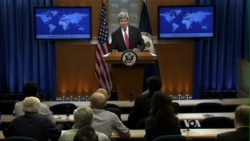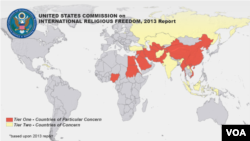U.S. Secretary of State John Kerry says countries that undermine religious freedoms ultimately threaten their own security.
Secretary Kerry says those who attack religious freedom not only unjustly threaten the people they target but undermine their own stability.
"From South Asia to the Sahel, governments have silenced members of religious groups with oppressive laws, harsh punishments, and brutal tactics that have no place in the 21st century," said Kerry.
This year's report on international religious freedom includes concerns about northern Nigeria where violence between the Islamist-militant Boko Haram and Nigerian security forces have claimed the lives of Muslims and Christians.
"In Nigeria, Boko Haram has killed more than 1,000 people over the last year alone. And that includes Christian and Muslim religious leaders, individuals who were near, near churches and mosques, worshipers and bystanders alike," said Kerry.
In Iraq, Kerry says the world has seen the "savagery and incredible brutality" of the Syrian-based Islamic State of Iraq and the Levant.
"The wholesale slaughter of Shia Muslims, the forced conversions of Christians in Mosul, the rape and executions and use of women and children as human shields. All of these acts of barbarism underscore the stakes," he said.
Human Rights Watch's Sarah Margon says Iraqi security forces have helped enflame sectarian tensions, making it difficult for Washington to support a government in Baghdad that has little support from Sunnis and Kurds.
"We are watching the political situation very closely to see how it works out. But unless there is a different political dynamic in Iraq I worry very greatly that the security forces aren't going to be defending an Iraq that would be inclusive and open for all Iraqis," said Margon.
In Burma, the religious freedom report decries violence against Muslims that Kerry says "continues to displace families and devastate communities."
"Thousands of Rohingya Muslims have been displaced in Burma in the wake of sectarian violence. And tens-of-thousands more are living in squalid camps without adequate medical care," he said.
In Russia, Kerry says Vladimir Putin's government is systematically eroding religious freedoms.
"In Russia, the government has used a succession of ever-more-punitive laws against what they call "extremism" to justify crude measures against people of faith," he said.
Kerry says repressive governments and extremist groups around the world are clear about what they stand against. So he says the United States must be equally clear about what it stands for.
"We are not arrogantly telling people what to believe. We're not telling people how they have to live everyday. We're asking for the universal value of tolerance, of the ability of people to have a respect for their own individuality and their own choices," said Kerry.
Margon says that is a message sometimes unevenly applied by Washington.
"It's part of smart development. It's part of good security measures. And the United States has sent that message sometimes when it's convenient, and other times it's fallen off the radar," she said.
This year's report on religious freedoms adds Turkmenistan to a list of countries of particular concern, where the Obama administration says people are beaten and tortured because of their religious beliefs.







